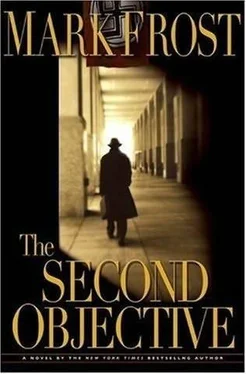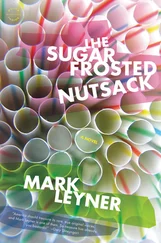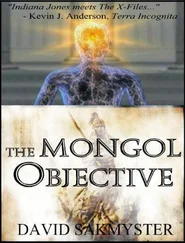Ververt gestured to a couple of chairs. The two men looked and moved like Americans. Soldiers, out of uniform, probably deserters, like so many others who sought him out. Listening to “ le jazz Américain ” from the quartet on stage, the audience was filled with the usual assortment of Allied servicemen, more than 50 percent on any given night. None had any idea they were paying for stolen U.S. Army liquor and cigarettes they should have been getting for pennies on the dollar at their officers’ club or PX.
“Is it always this cold in Paris this time of year? I’m gonna complain to my travel agent,” said the shorter one, rubbing his hands together. Then, to an appearing waiter: “How about a cup of coffee?”
Ververt could see that the taller man, who hadn’t spoken, was in charge but wanted to let the little one do the talking. The second man shook his head to the waiter. His eyes met Ververt’s for a moment, before respectfully looking away.
This one is interesting, thought Ververt.
“You speak English, right?” asked Eddie Bennings.
“I speak dollars,” said Ververt.
“It’s the universal language,” said Eddie. “We’re working from the same phrase book, my friend.”
Ververt looked at the two thousand, without making a move to pick it up. “What are you trying to say?”
The man leaned toward him, in the overly familiar way that Americans mistook for charm. “I believe that you had some dealings with a few of my former associates. Captain John Stringer and other officers from the 724th Railway Battalion.”
Ververt stared at him without responding until Eddie felt compelled to take a sudden interest in a book of matches.
“I don’t know anyone by that name,” said Ververt, pausing to light his next cigarette from the butt of his last. “Even if I did, and it happened that he had recently been arrested along with every other man in your battalion, why would I tell you about it?”
“Because you needed him,” said Eddie. “It’s left a hole in your supply chain. I worked closely with Captain Stringer, I kept his books, so I know how much business you did together. We never met, but that’s how I know about you.”
Ververt looked back and forth between the two men, as Eddie’s coffee arrived.
“I misjudged you,” he said.
“Sorry?”
“I thought you were military police. I am so relieved to learn you’re not working undercover,” he said, then turned to Von Leinsdorf. “Such a disadvantage in my business. I take everyone at their word.”
Eddie seemed bewildered by the man’s deadpan cynicism, and looked to his companion.
“What is your name?” Ververt asked the other man.
Von Leinsdorf didn’t seem to hear the question, looking toward the stage. “What’s with the jungle music?”
“They’ve played this way in Montmartre for twenty years. Le tumulte noir ; the tourists come for it. It’s as much a part of Paris as our contempt for them.”
“I thought the Germans put a stop to it.”
“When the Nazis took over, they decided it is degenerate music. A Negro-Jewish conspiracy to undermine the morals of the French, as if they had any, but a more particular threat to the morals of the Germans. Theirs, as you know, are more established as a matter of public record.”
“That’s rich,” said Eddie.
Ververt glanced at him again, then turned back to Von Leinsdorf. “My personal theory is that it reminds the Boches of the Jazz Age, Paris in the twenties, and the shame they suffered at Versailles. That’s what it’s about for them, this Nazi business. We’re all paying for rubbing their noses in the shit. So American jazz was banned during the Occupation. The last four years we play only ‘French jazz.’”
“The Liberation change that?”
“Now the locals can’t get enough. And the soldiers, the Americans, they like it, too. And they like our women,” said Ververt, looking out at the audience. “Especially the blacks.”
“So why call it American jazz?” asked Eddie. “Sounds the same to me.”
“These days if I called horse shit ‘American’ I could sell horse shit sandwiches. Paris will tire of you soon enough, you’ll see. Liberators quickly turn into occupiers.”
“You get any British in here?” asked Von Leinsdorf.
“Everyone comes to Montmartre. We create a fantasy here; that sin can be packaged, contained, sold like chewing gum. It appeals to a fundamental part of human nature, whether it’s Nazi, American, British, bourgeois, resistance, collaborator.”
“I don’t see any Brits.”
“They’re not allowed to wear their uniforms,” said Ververt. “Some concern that they mustn’t be seen in any boîte de nuit that traffics in this alleged black market.”
“That’s the English for you. Always erring on the side of propriety,” said Von Leinsdorf. “They don’t approve of premarital sex because it might lead to dancing.”
Ververt snorted, his approximation of a laugh.
“Don’t they have their own officers’ club?” asked Von Leinsdorf casually.
“They’ve taken over Maxim’s,” said Ververt. “Do you know it? The Rue Royale?”
“Who’s been to Paris and doesn’t know Maxim’s?” said Von Leinsdorf, with a Gallic shrug.
“It’s not the same. The gendarmes arrested the maître d’ recently, Albert, a very well-known, a very well-liked local personality.”
“For what reason?”
“For extending the same courtesies to the Nazis that he has shown the haute monde for twenty-five years. This was not collaboration, it was hospitality. An essential part of his business.”
“I’ll bet those same gendarmes who arrested Albert,” said Von Leinsdorf, “have been collaborating with the Nazis in Maxim’s for the last three years. And the only reason was to prevent Albert from testifying against them in the reprisals.”
“You see? Exactement! The perils of Liberation.”
“That’s what you can count on in times like these,” said Von Leinsdorf. “ Égalité, liberté, hypocrisie. ”
Ververt picked up the two thousand from the table. “Money has no politics. It will outlast ideology.”
“Ah yes, but will we, my friend?”
Ververt snorted in appreciation and pocketed the cash. “Come back tomorrow night. Seven o’clock, before we open.”
Von Leinsdorf stood up to leave and Eddie followed suit. He knew that Von Leinsdorf had forged a bond with the man, and that he’d gotten what they came for, but he wasn’t clear about how or when it had happened.
“Where do the Brits keep their officers’ mess?” asked Von Leinsdorf.
“The Hotel Meurice,” said Ververt. “Rue de Rivoli.”
“The Meurice. Ah yes. Walking distance from Maxim’s.”
“You get the idea.”
Ververt gestured to his flunkies and they escorted Von Leinsdorf and Eddie away. Von Leinsdorf surveyed the cramped, low-ceilinged room as they moved through the mixed-race crowd that included a number of interracial couples. All eyes were on the tiny stage, where the quartet was heating up, sweat pouring off them under the lights, blacks playing saxophone and bass, white men on piano and bass.
“Hey, Dick, you want a drink?” asked Eddie, catching up with him near the door, flushed with success. “They say it’s on the house.”
“I don’t drink with niggers,” said Von Leinsdorf, and walked outside.
The neon sign outside, LE MORT RAT, threw garish red light onto the wet pavement. They turned up their collars against the cold and threaded through the tangled warren of steep, cobblestoned streets toward the small apartment a few blocks away that Eddie had rented with cash after they arrived that morning.
Читать дальше












